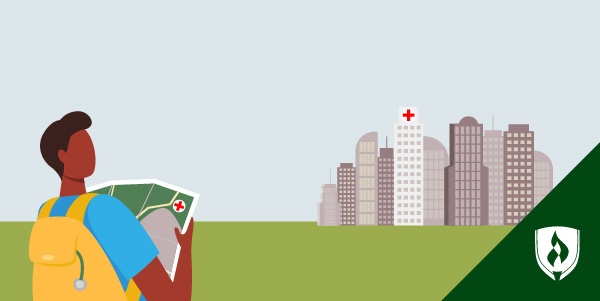
Regrets are a fact of life—people ignore weather forecasts and leave umbrellas at home, opt for cheaper products that fall apart and turn down invites to fun new things constantly. But some regrets are bigger than others. The subject of choosing a major or degree program can be an example of a big one. If you’ve earned a degree in a field that for whatever reason didn’t turn out to be what you imagined, it’s only natural to be a little concerned about transitioning into a nursing career.
But know this—it’s not too late to start a nursing career. If you’re interested in becoming an RN, don’t let what you perceive as a faulty first step in the short term stop you from pursuing a path you’d rather be on in the long term.
You can carve a unique path to the nursing career you’ve been dreaming of. To prove it, we’ve asked several second-degree nurses to share their experience transitioning into the field.
Get Your Nursing School Questions Answered at a Nursing Information Session
Finding a clearer path
Samantha Schulenburg’s journey began after she graduated with a bachelor’s degree in health science. Though she knew she wanted to work in the healthcare field, Schulenburg struggled with figuring out how to apply her education. After asking friends, family and the nurses in her life for their input about pursuing a nursing degree, she says she received enough variations of, “Duh, Sam! You’d make a fantastic nurse!” to finally commit.
“I decided that nursing was a career that closely aligned with the goals I had in life—to love and serve the people that needed it most,” Schulenburg says.
Instead of starting over at square one, Schulenburg’s next step was to enroll in the Rasmussen University Accelerated BSN program where her previous degree satisfied many prerequisites and enables her to complete her program comparatively quickly.
Though Schulenburg says she initially felt unprepared to become a nurse, she’s grown exponentially in her knowledge every quarter. “I felt like I knew literally nothing … but I have learned so much about how best to care for people.”
Though the fast-paced A-BSN program has been challenging, when it gets tough, Schulenburg says she reminds herself that she’s working toward a career that’s bigger than she is.
“I want to be a nurse because I saw the opportunity to use my unique skills and talents in a way that makes a difference in people’s lives on a daily basis,” she says.
A midlife change of pace
Will Hummel made the decision to become a nurse in an unexpected place: a hospital bed. At the time, he was nearly 45 years old and struggling with the grind of life. His career in sales and coaching meant weekly trips away from home and constant fretting over sales figures and earnings. Between a declining retail industry and his health, he needed a change. He knew he could use his diverse career experiences to become a successful nurse.
“After years in the business world, I felt a need to do something of genuine value to others,” Hummel says. “This desire to build a meaningful career in the service of others, plus the fact that I’m a self-proclaimed nerd for science, teaching and education, is what brought me to nursing.”
After spending the rest of his medical leave preparing for the TEAS test and researching BSN programs, Hummel landed on Rasmussen University. Since he wanted to enter the nursing workforce as soon as possible, Hummel also chose the Accelerated BSN second-degree entrance option. He liked knowing that he could complete the program in a relatively short amount of time—some may complete it in as few as 18 months.1 Now, Hummel has nearly completed the program and is on the path to becoming a registered nurse. Whether he works as a bedside nurse or chooses to continue his studies beyond a BSN, he’s looking forward to a truly meaningful career where he can serve others and find a work-life balance.
“I am excited for my future again,” he says.
A minor change of course
Megan Labudde completed her undergraduate biology degree knowing that she wanted to end up in the medical field; she just wasn’t sure what her exact role would be. During her first stint in college, nursing wasn’t stressed as a career option for biology majors, so she contemplated other paths like becoming a doctor or physician assistant. Upon graduation, Labudde says she was still weighing her options.
“I knew I wanted to do something medical, but I just didn’t know what,” Labudde says.
In the meantime she opted to get as much relevant experience as she could by working at a residential home for individuals with disabilities and memory disorders. In this role, she found inspiration by observing the nurse she worked with as she interacted with patients. Labudde says she was impressed with the nurse’s in-depth knowledge of the patients’ health issues and needs, how she treated the residents and communicated with the doctor. The more she observed the nurse’s role, the more she could see herself as a nurse.
“I feel like it’s such a cool thing to be able to care for patients when they are at their most vulnerable,” Labudde says. “It’s such a privilege to be able to be a part of their journey in healing.”
While the inspiration was welcome, Labudde still worried that becoming a nurse would mean getting another four-year degree, so finding Rasmussen University’s A-BSN program was a relief. She was able to transfer in credits from the classes she completed for her Biology degree to fulfill the Nursing program’s prerequisites, cutting down on the time she’d need to complete her nursing education. Though nursing school isn’t easy, Labudde knows that the rigor is there for good reason—keeping patients safe.
“You need to know what you’re giving your patient because you are the last line of defense,” Labudde says.
Ready for a career change to nursing?
You’ve read others’ reasons for changing career paths into nursing—so what’s yours? Whether you you’ve always wanted to work in healthcare or you’re discovering a newfound calling, it’s not too late to become a nurse. The good news is that if you have a degree, you won’t have to start from scratch as the Rasmussen University A-BSN second-degree entrance option was made for someone like you. Learn more about the program and get your questions answered in our article “What Is an Accelerated BSN? Your Fast Track to an Advanced Nursing Career.” Curious about different careers in nursing? Check out our related article, "what is forensic nursing?".
Related Articles:
- 7 BSN Courses to Expect During Your Nursing Education Journey
- Nurses Discuss the Importance of Emotional Intelligence in the Workplace
- What Is a Code Blue? A New Nurse’s Guide to Hospital Emergency Codes
- RNs Share the Pros and Cons of Being a Nurse
- What Is an RN Patient Care Coordinator and How Do You Become One?
- 9 Nursing Stereotypes That Are Just Plain Wrong
- Advocacy in Nursing: 5 Ways to Support Your Patients
- Magnet Nursing: 5 Advantages to Working in a Hospital with This Designation
1Completion time is dependent on credit transfers accepted and courses completed each term.
EDITOR’S NOTE: This article was originally published in 2016. It has since been updated to include information relevant to 2019.


.png)

